How to Stop Puppy Peeing in the House?
So, you’ve been working on potting training your puppy. You're always taking them out for walks or letting them out into the backyard for their potty breaks. And your puppy is doing well with potty training.
Out of the blue, your puppy peeing in the house. Why?
There are some common reason dogs start peeing in the house. Sometimes it’s a matter of you didn’t allow enough time to actually potty train your pup, you’ve given your puppy too much freedom too soon.
Most new puppy owners assume they’ll be able to teach their dogs everything within just a few weeks. It takes time for puppies to learn basic potty training skills.
To be successful at potty training, you’ll want to avoid accidents and ensure your dog always uses the right place for going number one. It requires patience and persistence.
PRO TIP: A good tip for cleaning after accidents is to use an enzymatic cleaner like Lysol. We were so impressed by the results we got from using our dog urine odor remover! It worked like magic - no need for harsh chemicals, just one simple step and voilà...no more odors.
Disclosure: Some of the links in this article are affiliate links (Amazon Associate or other programs we take part in). As an Amazon Associate, I earn a small commission from qualifying purchases.
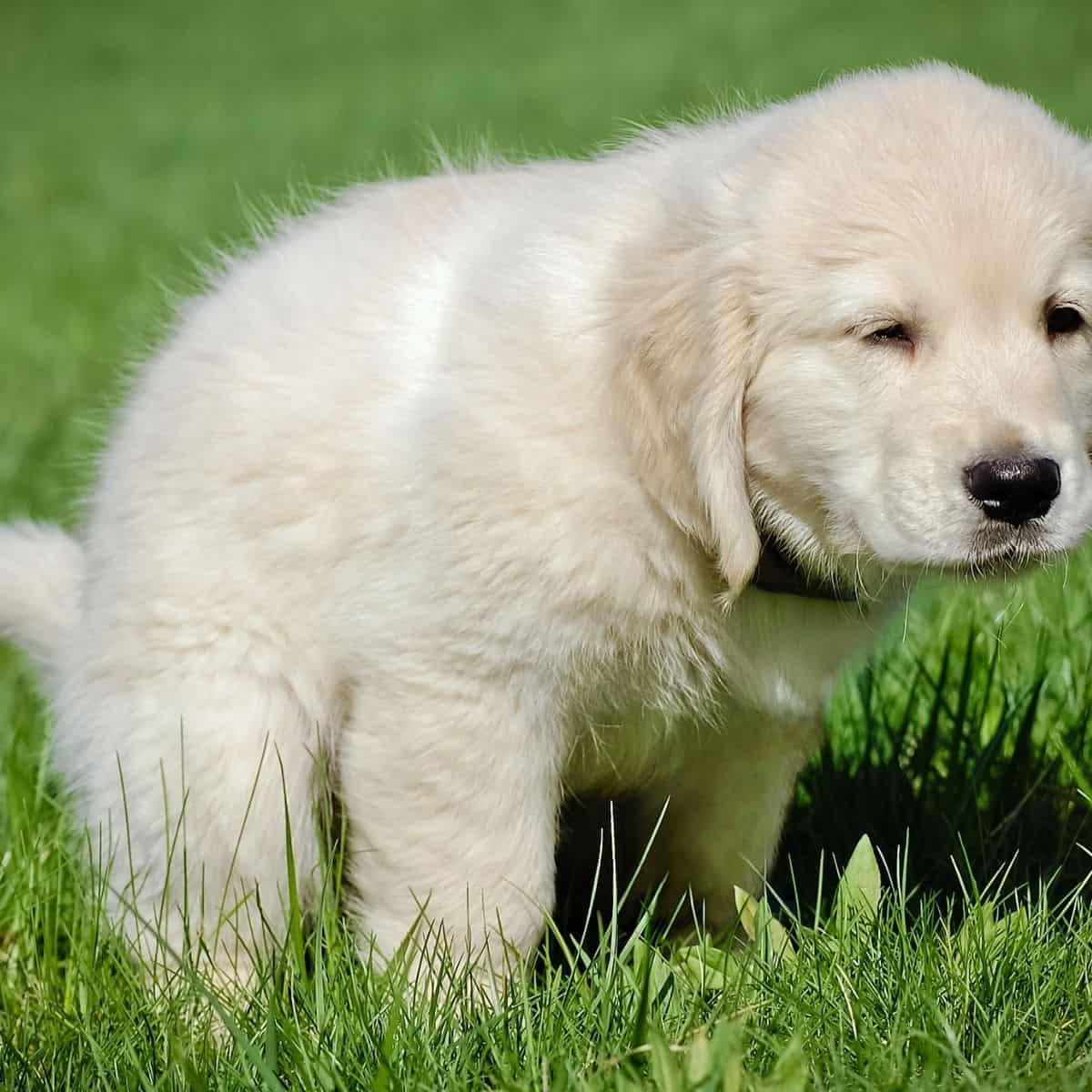
How to House-Train a Puppy With Praise and Rewards
Positive reinforcement teaches puppies by rewarding them for good behavior. If their behavior causes them to receive a positive reaction from others, then they’re more likely to repeat the good behavior. Potty training and puppy house training both require consistency.
In the beginning, you’ll put yourself in a position to watch your puppy for as many potty instances as possible. This means for the first few months you should watch your puppy every time you take him out so you can see him going potty.
When your puppy finishes, always praise and reward your puppy. It’s by positive reinforcement, your puppy will learn what we expect of them.
What If You Have to Leave the House?
If you need to leave your puppy at home, always take your puppy out to go potty before you leave.
In the beginning, you won’t want to leave your puppy for more than a couple of hours. As soon as you get back, take them out to go potty.
Praise and reward him when he goes potty, especially if he goes in the correct place.
How Often Should Puppies Go Out to Pee?
When your puppy is just a baby, With all the best intentions in the world, if you put a puppy in a dog pen dog crate overnight without potty breaks, he is likely to make a mess because he just can’t hold it until morning.
The best way to house-train a puppy is to keep to a routine and take him out at regular intervals. For the first week you have him (9 weeks of age), you can take your puppy out every 30 minutes to an hour. This will help to avoid any potential accidents.
However, the general rule of thumb with puppies is they can hold their bladder for their age in months plus one. So if he’s 2 months old, he might hold it for three hours (2 months plus one):
- 2 months old - Every 2 to 3 hours
- 3 months old - Every 3 to 4 hours
- 4 months old: Every 4 to 5 hours
Once your puppy has adjusted to his new house (after one to two weeks), he should adjust to the general rule of thumb quickly.
You should actively work to establish a consistent routine for your puppy’s potty breaks so that he can understand the house-training concept.
Take him out regularly throughout the day and during the night. You should create a potty-training schedule that coincides with your puppy’s daily routine.
Let him out first thing in the morning and last thing at night, and after naps, play sessions, and meals. As your puppy ages, you can start to gradually increase the time between these potty breaks.
Puppies can hold a full bladder control between 4 and 6 months of age. This means that there is light at the end of the tunnel with a little patience. You can teach a puppy to stop peeing in the house.
Don’t Ask Your Puppy to Hold it for Too Long
It takes puppies about 16 weeks to control their bladders. They can hold their bladder for only the number of months their age plus one.
A four-month-old puppy can only hold it for five hours. Your puppy may have an accident if you expect him to wait too long for a bathroom break.
You need to take your puppy to the same potty spot at least every 30 minutes when they first come home. Otherwise, they will be forced to go inside the house, inside a crate or into a safe area.
Potty pads can provide an indoor toilet for your puppy if you can’t take it out, but that might delay the entire housebreaking process by giving them two options instead of just one.
If you need to be away while your puppy is out, you can hire a pet sitter or ask a friend or neighbor to do it for you.
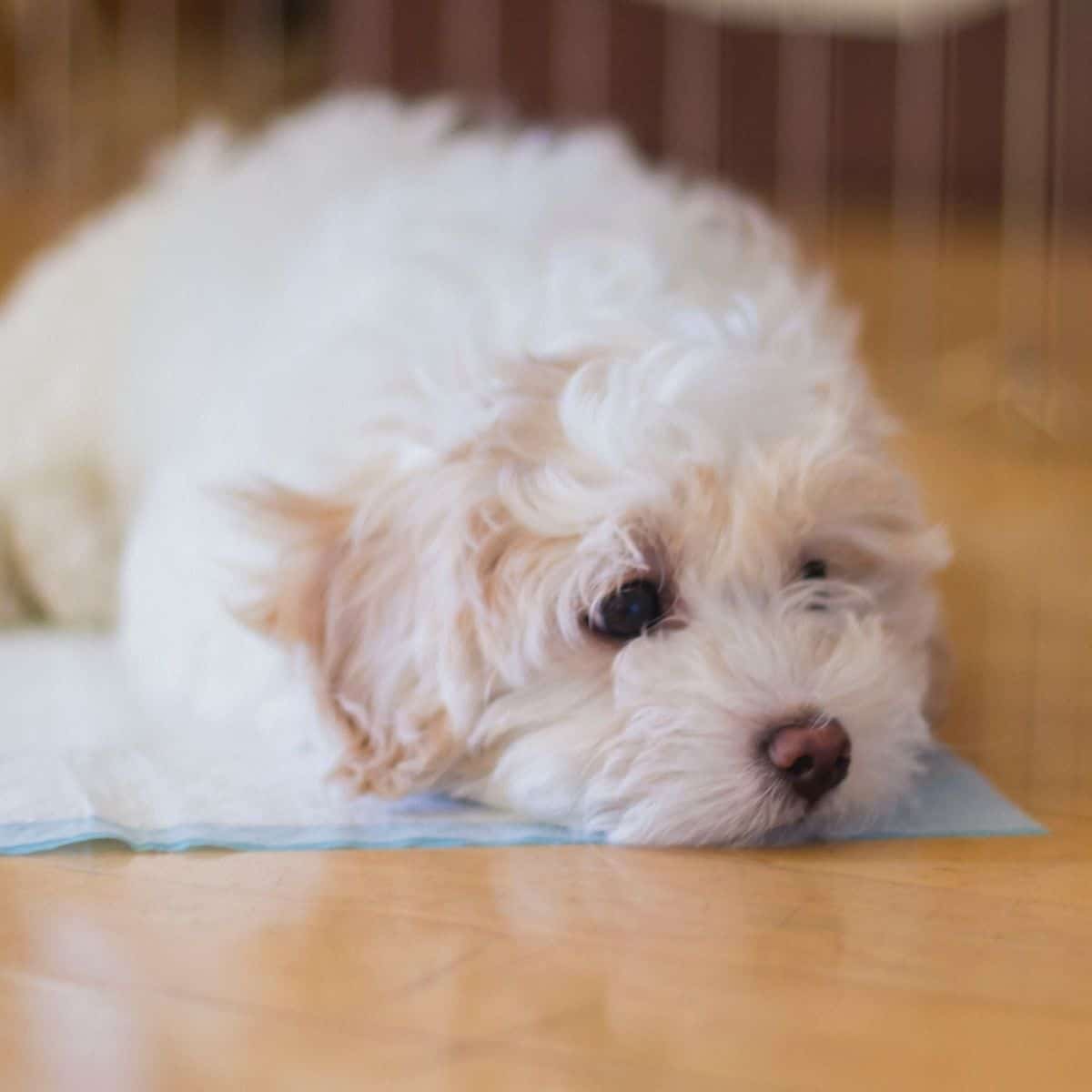
Don’t Ignore the Signs
How do you know when your puppy has to go?
Behaviors like sniffing, circling, and hunching the back can be a sign that your puppy needs to go potty.
As soon as you see a pre-potty signal, get your pup outside as soon as possible. Always applaud, praise, and reward your puppy for doing their business in the right place.
Puppy learns that it’s worth their time to wait to go outside the more times a reward is given for going outside.
Don’t Take Your Eyes Off Your Puppy
Dogs must learn where not to go just as much as where to go, so you have to keep your puppy from going to the wrong place.
While they might know the yard is appropriate, if they do not know the living room is not, you will not progress.
Because of this, supervise your puppy whenever it isn’t in its crate or safe place. If you don’t do this, it’s too easy to miss the warning signs that your puppy needs to go out.
Common Reasons Puppies Pee Inside
Pet owners know how frustrating it can be when their pets pee in the house. It’s especially frustrating when you're potty training. They go potty outside, then come in and go potty in the house.
If this is something that continues, your puppy may have a medical issue.
Here are some likely reasons a puppy peeing in the house.
1. Your Puppy Has A Medical Condition
Dogs, like puppies, can develop various diseases and infections that cause them to urinate more frequently.
There are several medical conditions that can cause puppies to pee inside the house after peeing outside repeatedly. My puppy suffered from a urinary tract infection, which is the most common.
Your pup may also need to urinate frequently if he has diabetes or kidney disease. You may also notice that your pup is constantly licking its genital area, drinking more water, and asking to go out.
You should take your puppy to the veterinarian even if they don’t exhibit any of these other behaviors. Inappropriate peeing can be a sign that your pooch has health problems.
Your vet will most likely take a urine sample from your pup and perform a urinalysis and probably a urine culture. Your pup’s urine will be tested to see if it has bacteria and abnormal cells.
Your veterinarian may want to do additional tests to rule out other causes of excessive urination if your puppy does not have urinary issues. Testing will depend on your pup’s other symptoms, and treatment will be based on a diagnosis.
2. Your Puppy Isn’t Completely Potty Trained Yet
Your puppy may also pee inside after going outside because they aren’t fully potty trained. Many new puppy owners believe their puppy is completely house-trained just because a few days have passed without a peeing accident.
Your puppy is given more alone time inside the house as you relax, when suddenly you notice a puddle on the floor.
It takes time, patience, and consistency to properly potty train a puppy. You can safely say that your dog is potty trained only if they haven’t had an accident within the last six months. Any less, and you will expect too much from your pup too soon.
It is unrealistic to expect your pup to be potty trained in one day, no matter how smart they are. If you’re struggling with house training, take your pup for a potty break every 20 to 30 minutes, and if they go, praise, reward, and repeat.
Over time, you will can extend the time between potty breaks and eventually train your pooch to hold it until it’s time to go for a walk.
3. Your Puppy Isn’t Emptying Its Bladder Completely While Outside
For puppies, going outside in the morning can be an exciting experience. In its eagerness to see you and spend time with you outside, your puppy may not completely empty its bladder the first time.
Puppies can also get overwhelmed by all the smells and sounds when in the backyard and forget why they are there.
Here, the puppy will remember to go potty only after they come back inside the house. It is possible that your puppy is overly excited if it pees outside quickly, then comes inside and pees again.
It is best to stay outside a little longer and give your puppy plenty of time to potty if your puppy is easily excited. You will know more about whether your puppy needs more pee by staying out for a few more minutes. If given the chance, some pups may even pee three or four times.
Taking your puppy to the same spot can be boring, but it will teach them to focus on going potty. After your puppy pees, praise them and offer treats.
If you have a completely enclosed yard, you can let your puppy off of the leash. This way, they will earn some fun time to sniff around and explore. There’s nothing better than a doggie door.
We have a doggie door to the backyard for Ruby and Callie, and it’s a lifesaver. I’ll never live in another house without a doggie door.
5. Your Pup Still Doesn’t Have Full Bladder Control
If your puppy is peeing inside the house, try to be patient and keep in mind that a young puppy doesn’t have control over their bladder.
Most dogs don’t start holding their urine for long periods of time until after four to six months of age.
It’s important for you to keep track of your dog’s water consumption because anything that enters his system has to exit somewhere.
If your dog drinks too much water, he’ll probably need to urinate several times before his bladder is fully emptied. If that happens, just let them out for another few minutes until they’re done.
Remember that puppies usually drink the most when they wake up, eat their breakfast, play for an hour or two, then go back to sleep.
It means that if your dog has accidents indoors, he’s probably going to be less inclined to go outside afterwards.
To avoid accidents when peeing outside, be sure to take your dog out before going to bed at night, right after eating dinner, and immediately following any kind of play activity.
Remember to let your dog go outside when they need to urinate, even if that means extending the time spent at the door by a few minutes. Always give your dog a treat after he has completed his task.
Aging Dogs
Old age can be one cause of urine accidents among dogs. Other reasons include illness, injury, stress, pregnancy, and so forth.
Sometimes, forms of dementia or senility may lead to house soiling in older dogs. They might not remember where they live or even who they belong to.
Older dogs may develop other health issues besides diabetes. As dogs get older, you’ll want to keep your veterinarian involved at a young age.
Sometimes dementia can be controlled by medication and supplements.
Urinary Tract Issues
Both male and female dogs can develop a urinary tract infection.
This is one of the most common reasons for dogs peeing in the house and one of the most frequent health problems issues in dogs.
Before you get upset with your dog, it’s always worth a visit to see if your dog may have developed a urinary tract infection. A simply antibiotic can usually clear up an infection and stop the peeing in the house.
Cystitis, crystals in the urine, bladder stones, maybe some things your vet could detect during an exam.
Urinary tract infections (UTIs) can usually be treated by taking antibiotics, changing one’s diet, drinking lots of water. In extreme cases, such as bladder stones may require surgery.
What do you do when you catch your puppy peeing indoors?
When you notice your dog pees indoors, immediately stop him by saying firmly, “No.”
Immediately, pick up your puppy to take them outside to their designated potty area.
Tell your puppy to go pee, or use your cue word for going potty.
Finally, shower lots of praise and reward your puppy after they have finished peeing.
Be sure your puppy has fully emptied its bladder before you praise them and giving treats.
Never yell, scold, or punish your puppy for peeing inside the house! Rubbing your pup’s nose in the urine on the carpet or floor won’t work either, so please don’t do it, no matter how frustrated you are.
Save and Pin it for Later
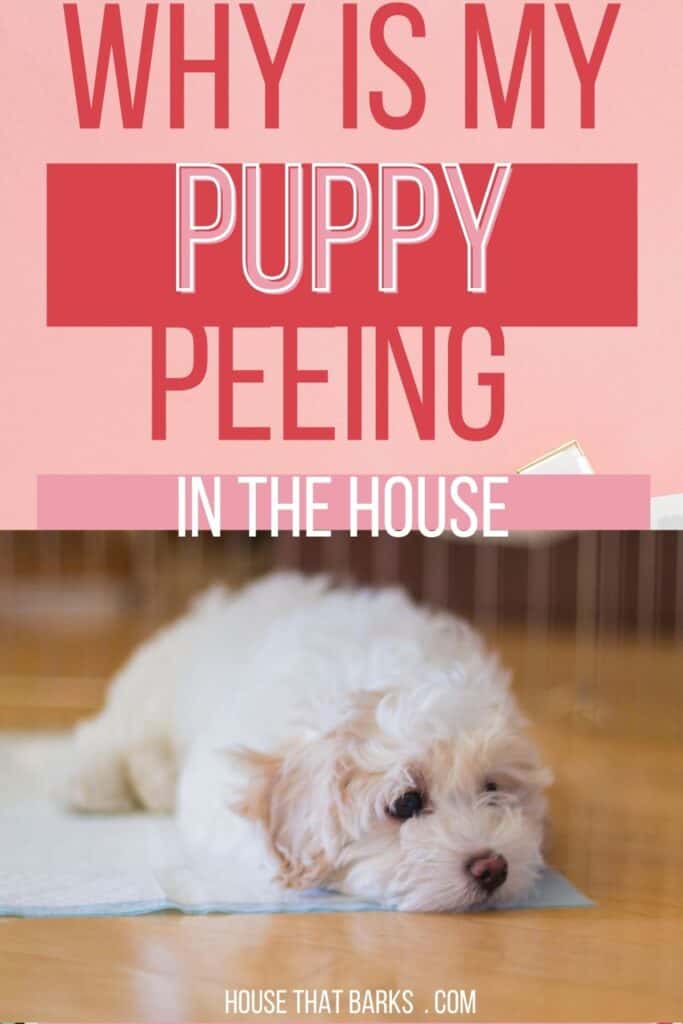

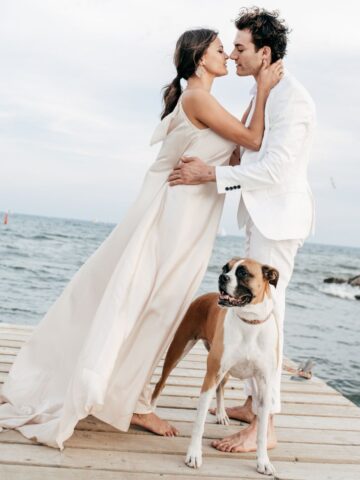
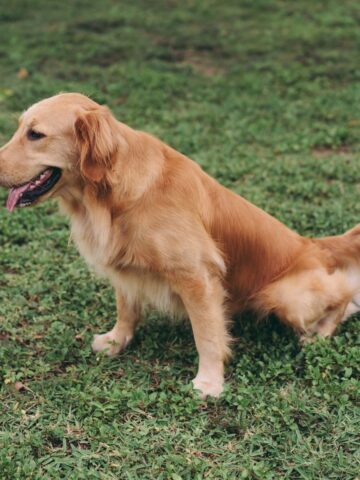
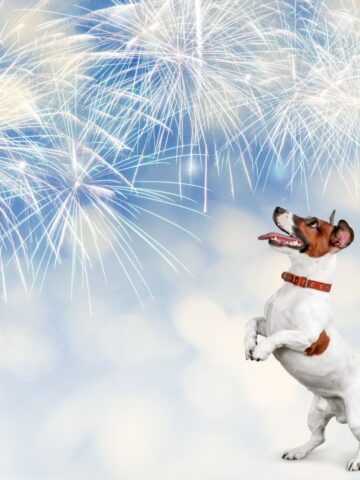
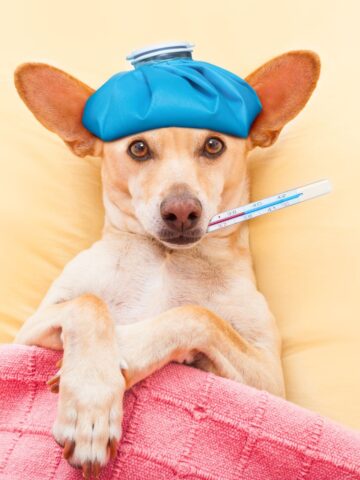
Leave a Reply